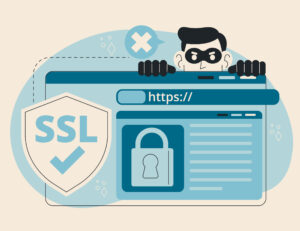
Source: Freepik
Finally, the time has come. Since December 06, 2022 hosted websites are automatically converted to “https” and provided with corresponding SSL certificates. The best thing about it? You don’t have to worry about anything anymore.
What is an SSL certificate and what is it needed for?
Servers use digital certificates to encrypt data. These digital certificates are known as SSL certificates. SSL is short for secure socket layer. They encrypt data exchanged between a web browser (e.g. Google Chrome) and a web server. This protects communication data from manipulation. Through an SSL certificate, the integrity and confidentiality of the website is verified and clarified. It works like this:
- the web server sends a copy of its SSL certificate to the web browser
- the web browser checks if the certificate is trustworthy
- if it is, it sends the “OK” to the web server
- the web server sends a digitally signed confirmation and initiates an encrypted SSL session encrypted SSL session
And what is new now?
The certificates for all websites will be created automatically from now on and will also be renewed automatically in the future. This eliminates the need for website owners to regularly create a new certificate. And this applies to all existing websites as well as to future ones!
What if my site did not have an SSL certificate yet?
The certificates for the pages are automatically created and then renewed in the future. However, in order for the certificate to be embedded correctly on the page, you must check whether changes are necessary in the configuration of the base URL. Depending on whether and which content management system is used to operate the page, the base URL must be changed to “https” in the configuration.
For example: instead of
Why does it make sense to create certificates automatically?
The changeover has several advantages. In the future, websites will already be provided with an SSL certificate directly as part of the order process. In addition, the users of the websites will no longer receive security warnings in the future if they call up the website and the certificate is missing or has expired. Moreover, the basic advantage, as already described above, is the encrypted data traffic, which leads to increased security of the site.
The best thing, however, is that in the future you won’t have to worry about the duration of your certificates. They will simply be renewed automatically.
Responsible for the content of this article are Katharina Röhrig and Janin Vreydal.




